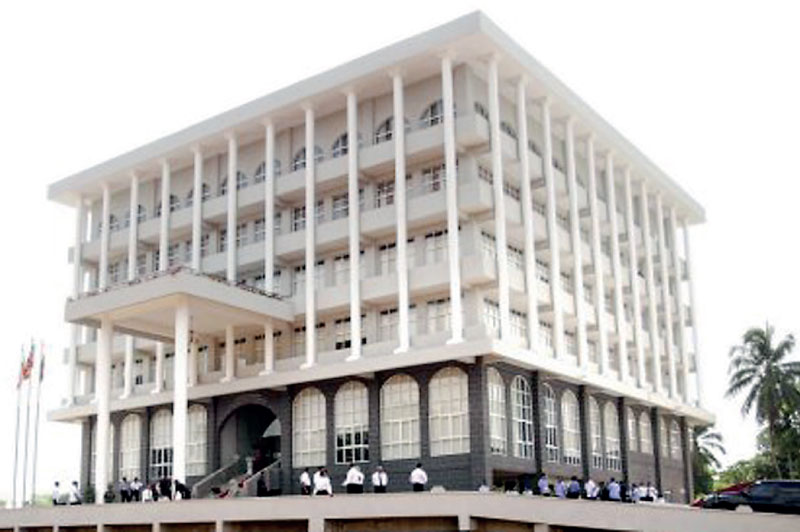Thursday Feb 19, 2026
Thursday Feb 19, 2026
Wednesday, 23 February 2022 03:15 - - {{hitsCtrl.values.hits}}

Auditor General’s Department
 Following an audit conducted by the Auditor General’s Department to evaluate the performance of the licensing and activation process for new renewable energy power projects in the process of developing new renewable energy sources, the AG has issued his report, adding also his observations and recommendations based on the facts revealed. Reading through it we find that it is an excellent contribution which will be helpful in the revival of this sector. These revelations would have been more meaningful if made a little earlier when the renewable energy sector developers were making a hue and cry about the several impediments and barriers, they have to cross in finalising their approval process.
Following an audit conducted by the Auditor General’s Department to evaluate the performance of the licensing and activation process for new renewable energy power projects in the process of developing new renewable energy sources, the AG has issued his report, adding also his observations and recommendations based on the facts revealed. Reading through it we find that it is an excellent contribution which will be helpful in the revival of this sector. These revelations would have been more meaningful if made a little earlier when the renewable energy sector developers were making a hue and cry about the several impediments and barriers, they have to cross in finalising their approval process.
If these obstacles were addressed and removed earlier, the crisis we are facing today would not have arisen. Belatedly though the report helps to articulate the grievances of the entrepreneurs. To that extent the Auditor General has to be commended for his invaluable disclosures enabling the policymakers to focus on the issues with more authentic information. It also serves as an exposure of what is happening at the bureaucracy level causing the delays.
This report is to be tabled in parliament. No doubt it will be a welcome move because it paves the way for a further discussion on the subject. The lawmakers will come to know more about the problems the sector is facing and will get the opportunity to take the necessary steps. It is to the Governments credit that action has been initiated already regarding many of the issues pointed out in the report. Nevertheless, the report with its authentic revelations, observations and recommendations will be a tremendous impetus to catalyse the ongoing stimulation of the sector. In the context of the current government policy expecting to increase the Renewable Energy generation to 70% by 2030 under a national plan, the report serves to provide the fuel to expedite the achievement of set targets.
There are institutions specially created to assist in the development of this sector.
The sustainable Energy Authority of Sri Lanka was established by Act No. 35 of 2007, including among other objectives, the role to identify, evaluate and develop renewable energy resources. This Authority is required to improve the approval and evaluation guidelines for New Renewable Energy projects and to promote them among investors in a manner that enhances the efficiency, productivity, economy and environmental balance of the energy sector. Sri Lanka is committed with the rest of the world to achieve the target of a Carbon Free Global Environment. The SEA was also expected to perform the intermediary role of serving as a one stop shop to help the developers to complete their approval processes expeditiously. Unfortunately, they remained confined within the monitoring role with least regard to promote the sector by assisting the Developers to overcome their difficulties in completing their approval process with several other State agencies.
The Public Utilities Commission has been established since 2002, under the Act No. 35 of 2002. The PUCSL is further empowered by the Sri Lanka Electricity Act No. 20 of 2009 to perform the following:
The other institution that is directly involved in the renewable energy sector is the Ceylon Electricity Board (CEB). But over a period of nearly seven years CEB has failed to resolve an issue they have raised arising out of a provision in the CEB Act.
The Auditor General’s Report points out the contradictions between the National Electricity Policy of the Government and a Long-Term Generation Plan (2022-2041) prepared by the CEB. In this regard, there had been, not only variances, but non-compliances on the part of the CEB vis-à-vis the policy lines endorsed by the cabinet. Some of these events are very recent ones. The key policy targets approved by the cabinet on 13-9-2021 targeted the following objectives:
This, however has become a bone of contention for the CEB. A specific directive to the Secretary Minister of Power to direct the Chairman CEB to take immediate steps to prepare a Least Cost Long Term Generation plan 2022-2041, based on the general policy guidelines applicable to the power industry, by a cabinet decision, has been disregarded by the CEB. This non-compliance has led to the PUCSL returning the plan prepared by the CEB with a request for them to submit a corrected version of their plan in line with the declared Government policy before 30 June 2022.
Government wants the renewable energy sector to generate 70% of the electricity from renewable sources by 2030, but the CEB limits it to 50% of the total electricity requirement according to their projections.
The Audit Report has shown the following defects and deficiencies in the project approval process;
a. Although the National Policy states that it will reduce the length of time required for the approval of the renewable energy projects to less than 2 years through a central coordination mechanism, the necessary steps have not been taken so far.
b. The policy requires the appointment of a committee by the Ministry of Power and Energy, consisting of govt. agencies and line ministry to coordinate the approval and land acquisition, it has not been appointed.
c. The CEB has suspended the signing of power purchase agreements with the licensees of the SEA with effect from about 2016.
d. The Power Purchase Agreements were done according to the standard tariff approved by the cabinet to encourage private sector investors. But the CEB has raised objections and insist on a rate structure which is disadvantageous to the developers.
The net effect of all these shortcomings is as shown in Table 1.
The report states, “To engage to the agreements of 1,374 projects relating to 4014.44 MW approved by the Sustainable Energy Authority under the standard tariff by the CEB based on the provision for the purchase of energy by bidding at minimum cost at competitive prices for extension, supply of new generation plants according to section 43(4) of the Sri Lanka Electricity (amendment) Act No. 31 of 2013 had been suspended from 1 January 2017 with immediate effect. However, although the Sustainable Energy Authority had been collecting applications and fees from developers for the construction of power plants since 2017, the action had not been taken on those projects so far.”
This indicates the plight of the renewable energy developers waiting until the three State bodies set up to facilitate the sector (SEA, PUCSL and CEB) take some kind of action in this regard. What happened was each of them waited as if it is nobody’s business to initiate some action, by blaming each other. The irony of the matter is renewable energy that is to be supplied at a cheaper cost to the National Grid continued to remain hibernated facing these obstacles while the fuel-based energy supply (which is purchased at a very high cost), was moving smoothly, well-supported by the same officials who discouraged the renewable energy developers.
The Audit report has many recommendations which deserves immediate attention of the policymakers. But the most unfortunate situation is when such a report is tabled in Parliament, instead of subjecting it to an objective examination and review of the status of the industry, the focus of the debates will be diverted to other petty issues. We have seen what has happened to many findings of the COPA and COPE committees. Despite shocking revelations about hundreds of millions of public funds wasted, none have been held responsible for those. Let us hope and pray that sanity will prevail when this report is tabled in parliament.
Here is a different situation. When the Government in power is interested to improve and develop the renewable energy sector, some officials with self-interests and some government agencies due to their intransigent attitudes and administrative weaknesses stand as stumbling blocks. Let both the Government and the Opposition address this matter in that perspective and bring about a lasting and feasible resolution jointly to this national issue.
It has to be understood that the mini-hydro and renewable energy developers are a heavily exhausted lot today, due to long years of waiting, spending time and money to start their projects. Virtually fed up. This long wait has also caused them to face several new handicaps like price increases in machine costs, the freight elements, labour and construction expenditures. The banks too which came to finance the industry during the early periods under different subsidy schemes have now begun to apply normal commercial lending rates for the facilities granted to this sector although this is a high priority sector deserving to be treated and considered in that perspective.
Central Bank cannot produce energy. But it can promote alternate energy production. CBSL has to support the Government policy in this regard. CBSL will have to address how they can help the sector. One way is they can step in to the financing domain. The commercial banks could be made to offer a special loan scheme to the sectors identified as high priority areas by relaxing the Statutory Reserve Requirement that banks are required to maintain as a deposit with the Central Bank, equal to the extent of loans they grant to these sectors. The commercial banks could be made to lend at a special concessionary rate based on this allowance. This will be a great relief to the renewable energy developers and a worthy incentive to the industry.
The Audit Department has done a great service to the nation by publishing this performance report. Now the whole country will know to what extent the CEB, SEA and PUCSL have contributed to the slowing down of the development of the renewable energy sector in this country.
